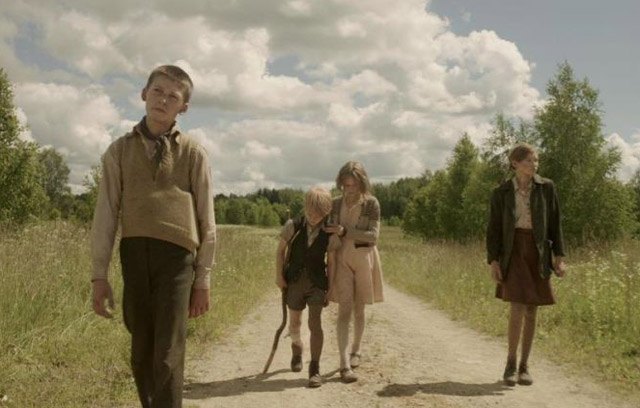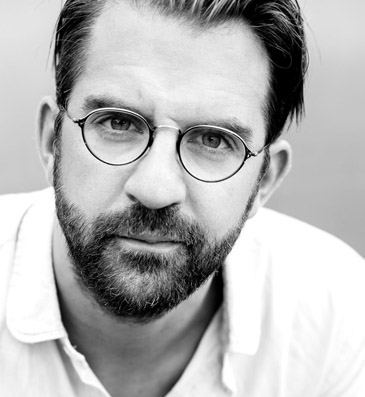CHICAGO – Patrick McDonald of HollywoodChicago.com appears on “The Morning Mess” with Dan Baker on WBGR-FM (Monroe, Wisconsin) on March 21st, 2024, reviewing the new streaming series “Manhunt” – based on the bestseller by James L. Swanson – currently streaming on Apple TV+.
Interview: ‘Wolfskinder’ Director Rick Ostermann at 2013 Chicago International Film Festival
CHICAGO – “The world comes to Chicago” is the mantra of the 49th Chicago International Film Festival, and one of the notable international films was “Wolfskinder,” from Germany. The story of post World War II orphans, or ‘wolf’s children,” is an impressive feature debut by director Rick Ostermann.
 Photo credit: Chicago International Film Festival |
The journey follows two boys, whose mother is dying. She tells them to join their aunt in Lithuania, and passes away. The peril of that long road is overwhelming, and changes the lives of all the children who are on that road. HollywoodChicago.com caught up with director Rick Ostermann last week, after his American debut at the Chicago International Film Festival.
HollywoodChicago.com: This is your first feature film. What source, inspiration or emotion motivated you to tell this story as your first full-length narrative?
Rick Ostermann: It was about my family background and history. When my mother was four years old, she had to run away with her family as soldiers came into her town. Because of this, I became attached to the topic of post-World War II. I came across the wolfskinder, and began reading about them, and felt that their story should be told – because nobody knows it, even in Germany they don’t really know.
HollywoodChicago.com: Emotionally, what is the most personal element of yourself that is found in this film?
Ostermann: When you see the film, there is one moment in which Hans [the main character] is opening up his mother’s amulet. There is the photo of his mother, and on the other side is this man. That man is my grandfather. That was the emotion, and why I put it in there.
HollywoodChicago.com: The older children actors in the film could connect to the understanding of their characters. What did you do to make the younger actors understand the historical content and being on their own?
Ostermann: With the very youngest actors, I didn’t talk a lot about history. The older ones, they got it, and there are a couple books in Germany about the wolfskinder that are written for kids. I gave those to the older ones. For the younger ones, it was about kids living in nature and living to survive.
HollywoodChicago.com: Water is used in the film in various ways, as an obstacle, a playground of joy and a source of escape and deliverance. How did water become a major theme in this story?
Ostermann: Was is really interesting is that I have released the film in Germany and gave several interviews in Venice. Now, as I debut the film in Chicago, everybody is asking about the water. Nobody asked about this before. [laughs] The secondary character in this film is nature, and water is part of nature. There is naturally a lot of water in Lithuania, and I was looking to capture that part of nature. When the wolfskinder were swimming, I was just looking for a moment where kids could be kids.
HollywoodChicago.com: There are a couple poignant scenes in which Hans is reading ‘The Origin of the Species.’ How does Darwin’s discoveries and words add irony to the circumstances of the humans that are separated from their tribes?
Ostermann: When I knew that Hans was going to read a book in the story, I wanted to figure out what he would read. I thought he must be reading something about a different country and nature. My Director of Photography thought Darwin, because it is the survival of the fittest. That was it, because it’s a theme in the film. But I intentionally chose a passage from the book, the first time he reads it, that could have been anything. People connect to Darwin the second time he reads it, because of the turtles, but the first time I kept it vague.
HollywoodChicago.com: Many of the adventures along the road for the children are specific in who and what is involved in them. In writing the screenplay, did you plan the order of who they would encounter and what would happen as specific symbolism, or was it more random?
Ostermann: It was written as you see in the film, and yes it was all on purpose. I was able to shoot the film chronologically, and was able to decide many of the good moments on film right on the set.
HollywoodChicago.com: I was thinking of another stark post war narrative, ‘A Woman in Berlin.’ How does the truth of man’s inhumanity to man reflect on warfare nearly 80 years after World War II?
Ostermann: It was hard to finance this film, because it was a movie of Germans as victims during the Second World War. It’s still a hot topic in Germany. I always say I know what happened, that it was my nation that caused the war, and caused all the horror associated with it. But now that a few generations have passed, we can open new angles for which we can look at that point in our history. I’m not saying that the Germans were victims of the Second World War, not at all, but what I am saying that the stories are many, and we can now think about them all.
HollywoodChicago.com: The generation that actually participated the war are dying by large numbers. What do you think they want us to remember about how that war affected them?
 Director Rick Ostermann in Chicago, October 16th, 2013 Photo credit: Chicago International Film Festival |
Ostermann: I had some interviews with the wolfskinder. From my point of view, I felt that they didn’t want to open up those stories again. Many of them said, ‘I’ll tell you the story once more, and then I drop it in the box.’ They were reluctant to open up again, because of the emotions of it. My mother and uncle never talked about their story, only when I asked them. In general, the German people don’t want to talk about it any more. So maybe, films like ‘Wolfskinder’ is a way to keep that history alive.
HollywoodChicago.com: You’ve worked on various television productions over the years in Germany. How did that work finally steer you towards becoming a film director? Was that the intention all along or did it happen because of your path in television?
Ostermann: I started working in the film industry after school was over, started making coffee on film sets. This led to moving up the ladder, all the way up to Assistant Director on TV shows and other films. I was close to two directors for about five years, doing films for them. This was my film school, being around these directors. It was a longer time than ordinary film school, but I wouldn’t have it any other way.
HollywoodChicago.com: In your observation, what do you think is the main difference between the entertainment tastes of the German culture versus the American culture?
Ostermann: This is my first time in the United States…
HollywoodChicago.com: Oh wow, welcome.
Ostermann: Thank you. Everything is new for me and I’m a little bit overwhelmed, because everybody is so friendly and open hearted. Now Germans are open-hearted as well, but they are very much more reserved. Everything is in the ‘hat,’ and nobody let’s you look inside. Therefore the entertainment in Germany is much more cerebral, in the head. Here it’s like boom! [laughs] Germans try to do that, but it just doesn’t work out.
HollywoodChicago.com: Finally, when you talk about your love for filmmaking, what do you talk about first?
Ostermann: Here’s an example. I had a screening with 200 students from Columbia College here. And I was sitting there, and even though I’ve seen the film hundreds of times, I had to sit there and watch it with the students. I listened for the reactions. And in all those reactions, I thought this why I make movies, for the audience and their entertainment. They got to feel those emotions. I’m from a smaller country, first time abroad, and they were going with my feelings and emotions. That’s what filmmaking is all about for me. It’s fantastic.
 | By PATRICK McDONALD |


